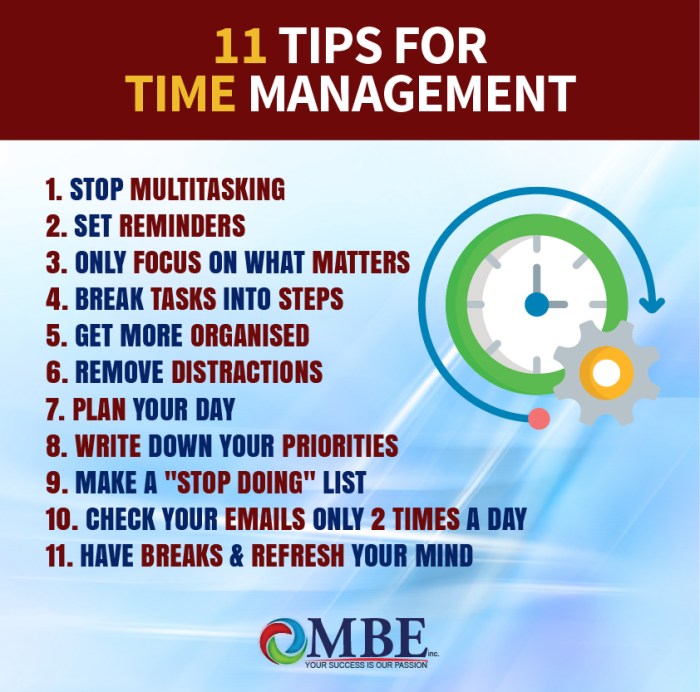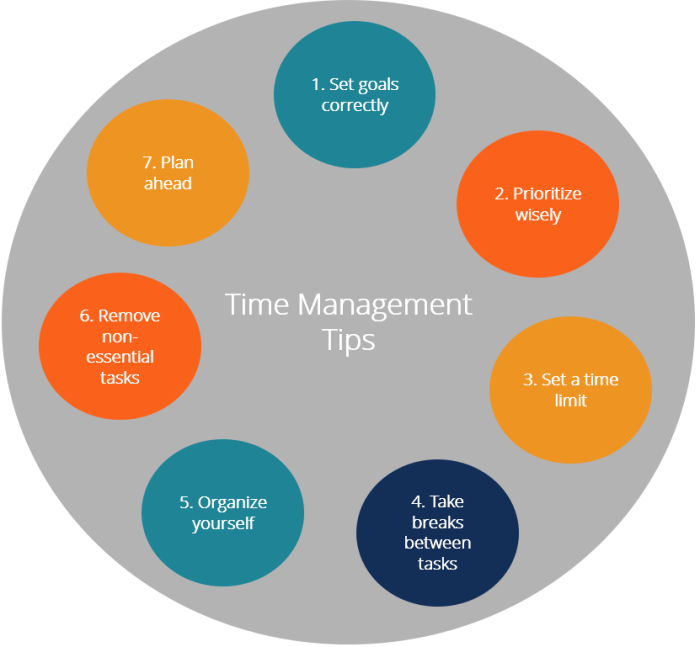Time Management Tips sets the stage for this enthralling narrative, offering readers a glimpse into a story that is rich in detail with american high school hip style and brimming with originality from the outset.
In the fast-paced world we live in, effective time management is key to success. It’s not just about getting things done; it’s about getting them done efficiently and with minimal stress. Let’s dive into some valuable tips to help you take control of your schedule and maximize your productivity.
Importance of Time Management
Time management is crucial for personal and professional success as it allows individuals to prioritize tasks, allocate time efficiently, and achieve goals effectively. Effective time management can help improve productivity by ensuring that important tasks are completed on time, leading to a sense of accomplishment and reduced stress levels. For example, setting clear goals, creating a schedule, and avoiding procrastination are key strategies that can enhance productivity and overall performance.
Impact on Productivity
- Proper time management ensures that tasks are completed in a timely manner, leading to increased productivity.
- Setting specific goals and deadlines helps individuals stay focused and motivated to accomplish tasks efficiently.
- Eliminating distractions and prioritizing tasks based on importance can optimize work performance and output.
Effect on Work-Life Balance
- Effective time management allows individuals to allocate time for work, personal activities, and relaxation, leading to a balanced lifestyle.
- Poor time management can result in excessive work hours, causing stress, burnout, and neglect of personal relationships and hobbies.
- Maintaining a healthy work-life balance through proper time management is essential for overall well-being and mental health.
Strategies for Effective Time Management
Effective time management involves various techniques and strategies to help individuals make the most of their time and increase productivity. By prioritizing tasks, setting goals, creating schedules, and avoiding procrastination, individuals can manage their time efficiently and achieve their objectives.
Techniques for Prioritizing Tasks and Setting Goals
- Make a to-do list: Write down all tasks that need to be completed and prioritize them based on deadlines and importance.
- Use the Eisenhower Matrix: Categorize tasks into four quadrants – urgent and important, important but not urgent, urgent but not important, neither urgent nor important.
- Set SMART goals: Ensure goals are Specific, Measurable, Achievable, Relevant, and Time-bound to stay focused and motivated.
Benefits of Creating a Daily or Weekly Schedule
- Organized approach: Having a schedule helps individuals plan their day or week in advance, ensuring all tasks are accounted for.
- Time allocation: Allocate specific time slots for each task, allowing for better time management and productivity.
- Prioritization: By scheduling tasks, individuals can prioritize important activities and avoid wasting time on less critical ones.
Tips on How to Avoid Procrastination and Stay Focused
- Break tasks into smaller steps: Divide tasks into manageable parts to prevent feeling overwhelmed and reduce the likelihood of procrastination.
- Set deadlines: Establish deadlines for tasks to create a sense of urgency and prevent procrastination.
- Eliminate distractions: Identify and remove distractions such as social media, emails, or noise to maintain focus on the task at hand.
Tools and Apps for Time Management: Time Management Tips

In today’s fast-paced world, utilizing tools and apps for time management can be a game-changer in staying organized, focused, and productive. These tools offer a variety of features to help individuals prioritize tasks, set deadlines, and track progress efficiently.
Popular Tools for Time Management
- Todoist: A versatile task management app that allows users to create to-do lists, set reminders, and collaborate with others on projects.
- Trello: A visual project management tool that uses boards, lists, and cards to organize tasks and track progress in a flexible way.
- Google Calendar: An easy-to-use calendar app that enables users to schedule events, set reminders, and sync across devices for seamless planning.
Comparison of Software Options
| Tool/App | Features | Platform |
|---|---|---|
| Todoist | Task lists, reminders, collaboration | Web, Mobile |
| Trello | Visual boards, task cards, progress tracking | Web, Mobile |
| Google Calendar | Event scheduling, reminders, syncing | Web, Mobile |
Choosing the Right Tool, Time Management Tips
- Consider your preferences: Some individuals prefer visual organization like Trello, while others may opt for a simpler interface like Google Calendar.
- Assess your needs: Determine if you need features like collaboration, task prioritization, or deadline tracking to select the most suitable tool.
- Try out different options: Take advantage of free trials or demos to test different tools and see which one aligns best with your workflow.
Time Management in Different Settings

Having effective time management skills is crucial in various settings such as work, school, and personal life. Each setting comes with its own unique demands and challenges, requiring different strategies to manage time efficiently.
Work
In a work setting, time management is often centered around meeting deadlines, attending meetings, and completing tasks efficiently. To effectively manage time at work, consider creating a daily to-do list, prioritizing tasks based on urgency and importance, and minimizing distractions to stay focused.
School
Time management in a school setting involves balancing assignments, studying for exams, attending classes, and participating in extracurricular activities. To excel academically, students can benefit from creating a study schedule, breaking down tasks into smaller manageable chunks, and utilizing tools like calendars or study apps to stay organized.
Personal Life
In personal life, time management is essential for maintaining a healthy work-life balance, pursuing hobbies, spending time with loved ones, and taking care of oneself. To manage time effectively in personal life, consider setting boundaries, prioritizing self-care activities, delegating tasks when possible, and learning to say no to commitments that do not align with your priorities.